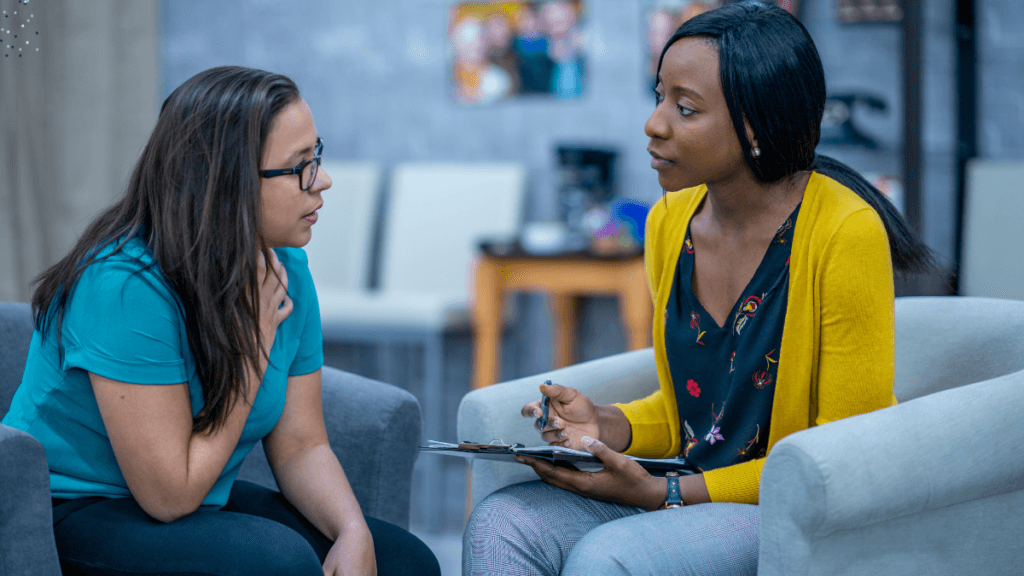Social skills refer to the ability to interact effectively with others. They include how you listen, how you show you are listening, how you use your words to communicate, and empathize with people.
Social skills allow you to feel more comfortable around others, whether you are building relationships with friends, at work, or within your social circle.
Investing your time and energy into bettering your social skills will not only make others like you, but yourself too! When you know how to better express yourself around others, your relationships with everyone will grow.
10 Ways to Build Trust & Improve Your Social Skills
1. Listen Actively

Active listening is a great way to improve your social skills. When you practice active listening, you are telling the other person that what they have to say is important to you. You build trust when others know you care about their thoughts and opinions.
Active listening is all about paying attention to what the person is saying.
Follow these tips to help you better understand active listening:
- Maintain eye contact: This is one of the easiest ways to show you are listening. By looking at the other person, you are showing them you care about what they have to say.
- Nod your head: This subtle gesture shows you understand what the person is saying.
- Let them finish speaking: Allow the person to get their thoughts out. You can always speak afterwards. When you jump in and speak over someone, you are not only being rude, but you aren’t letting them finish their thought. Take a moment to let the thought sink in before responding as well.
If you find yourself zoning out, redirect yourself back to the conversation.
You can repeat what they have said in your own words. Try saying something like, “So what I hear you saying is…” This allows the person to clarify what they said. It also shows you understand how they feel, which can create a connection.
Read Also: How to Change your Life (10 Ways)
2. Use Open Body Language
Your body language can speak volumes before you even say a word. Open body language is one of the simplest tips to help improve your social skills and help you gain trust from others.
What is open body language? Everything you do from your shoulders down can portray open body language. It includes your stance and your gestures.
When you have an open stance with relaxed shoulders, you appear more confident.
Try to avoid crossing your arms in front of you. This can make you appear closed off to others.
Keep your arms by your side and use gestures when you speak. This is a welcoming gesture and can help others be more open with you.
Smiling is also a huge part of open body language. When you smile, you seem friendly and allow others to feel comfortable around you.
Eye contact is another important aspect of open body language. You want to show the other person that you care about what they have to say.
Standing too close or too far away from someone can make you appear closed off. Try to find a happy medium when standing next to another person.
Read Also: Instant Confidence Boosters
3. Ask Open-Ended Questions
Asking open-ended questions is another great way to improve your social skills. An open-ended question will be something that is not answered with a yes or no. These types of questions will allow the person to talk more and you to learn more about them.
For example, you may ask:
“What did you think of the event?”
Instead of:
“Did you enjoy the event?”
You want to use open-ended questions that will force the person to open up. “What” and “how” are great ways to start an open-ended question.
You may ask:
“How did you come to that conclusion?”
This not only makes the person learn more, but shows you care about their opinion.
Read also: 100 Provocative Questions for Thoughtful Discussions
4. Share Your Thoughts & Feelings
Sharing your thoughts and feelings with others is a great way to learn how to build trust. When you open up to others, you allow them to do the same.
Not only will sharing your thoughts allow others to understand you better, but you will feel closer to that person.
Sharing your feelings allows you to clear your mind and others to do the same. When you build a healthy relationship with someone, you should be able to share your thoughts with each other.
If you open up to someone, it will make others feel more comfortable opening up to you.
Tip: You want to be careful where and who you share your thoughts with. Make sure you choose your audience before sharing your feelings.
When having a conversation with someone, listen and try to empathize with what they are saying.
5. Be Mindful of Your Tone

Another way to better your social skills is to be mindful of your tone. The tone you use when speaking to others can determine if they trust you or not.
You want to come off as friendly and positive when talking to others.
If you are smiling while writing someone an email, you are more likely to use a positive tone.
If you can, the person you are talking to will feel more at ease. Once someone feels comfortable, they will trust you more.
Try putting yourself in the person’s shoes before speaking to them.
You can raise your tone or lower your tone depending on the person you’re speaking to.
Pay attention to their body language and the way they speak. This will help you decide on what tone you should speak.
Practice mindfulness before speaking to someone.
This will clear your mind and you will be less likely to say something you don’t mean.
6. Practice Empathy
Empathy is the ability to put yourself in someone else’s shoes. When you practice empathy, you are learning how to improve social skills with others and build trust.
If someone is sharing something with you, empathize with what they are saying.
Instead of thinking about what you are going to say next, take in what they are saying.
You can show empathy by saying something like:
“I can see that you’re really upset about this.”
Not only are you showing that you understand how they feel, but you are encouraging them to continue talking.
You can even ask open-ended questions to show empathy.
Try asking them how they felt in the situation.
7. Find Common Interests
When you find common interests with someone, it will be easier for you to develop a relationship with that person.
If you meet someone who has the same interests as you, you will have plenty to talk about with that person.
You can find someone’s interests by simple observation.
If you’re at an event, watch if there is someone who seems to enjoy the activity as much as you.
You can even ask questions to find common interests.
Ask questions that will force the person to talk about themselves. You may ask:
“What do you like to do for fun?”
“What’s your favorite book you’ve read?”
If the person happens to say something that you enjoy as well, you’ll have a great topic to talk about and really connect with that person.
Make sure you are listening to what the person has to say. If you show interest in what they like, they will show interest in you.
8. Offer Genuine Compliments

Who doesn’t love receiving compliments? When you tell someone that they are doing a good job or you like their shirt, you are making that person feel as though they are valued and appreciated.
Everyone likes to feel useful and that what they are doing matters. If you offer others genuine compliments, they will trust you.
Try to be as specific as possible when telling someone a compliment.
Instead of saying, “You’re great,” say something like:
“I really enjoy watching you work! You’re a natural.”
This will sound much more genuine, and the person will appreciate you saying that to them.
Make sure the compliments you’re giving are appropriate to the situation.
Don’t go overboard with the compliments. You don’t want to seem fake.
Make it a habit to tell others things you like about them.
9. Follow Through on Commitments
If you say you are going to do something, make sure you follow through with it. If others know you are trustworthy, they will trust you.
Try not to take on more than you can handle. If you commit to doing something, you should follow through with it.
If you know you aren’t going to be able to finish a task that you told someone you would do, let them know ahead of time.
For example, if you tell someone you will have a report to them by Monday, and you know you won’t make that deadline, tell them you won’t be able to make the deadline, and when you will be able to finish.
If you consistently finish the things you say you will do, others will learn to trust that you will always finish what you start.
10. Practice Patience
Building trust and social skills takes time. You can’t rush into something and expect everything to work. If you meet someone, take your time and get to know that person.
If someone seems shy to open up to you, don’t rush them; let them warm up to you.
If something isn’t working out between you and another person, don’t rush the situation; let it work itself out.
Learning social skills will also take time. You won’t notice a change overnight.
As you practice your social skills, you will begin to notice you’re getting better.
Practice, Practice, Practice
You can practice your social skills by going to local events. This will allow you to meet new people who have the same interests as you. You’ll be forced to talk to others, which will help you improve your conversation skills.
You can volunteer at your local community. You will come across many different people and situations when volunteering.
This will allow you to practice interacting with others.
Any time you interact with another person is time you can practice your skills. If you feel you messed up while talking to someone, you can try again the next time you speak.
You can even practice at home! Next time you’re hanging out with friends, try to practice what you would say in certain situations.
You can practice conversation with your friends. This will help you think of things you would like to say when you’re out interacting with others.
Also, you can practice when you’re alone as well!
The more you practice something, the easier it becomes. Once you gain trust from others by being successful at socializing, you will feel more confident.
Socializing will become second nature to you as you continue to practice going forward. Don’t be afraid to step out of your comfort zone; you can start improving your skills today!
Save the pin for later



